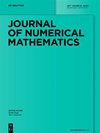反应扩散PDE系统图灵模式逼近的自适应POD-DEIM校正
IF 4
2区 数学
Q1 MATHEMATICS
引用次数: 1
摘要
摘要研究了模型阶降简(MOR)技术在反应-扩散PDE (RD-PDE)系统稳态解图灵模式数值逼近中的合适应用。我们证明了由经典固有正交分解(POD)建立的代理模型的解在约简空间的维度上表现出不稳定的误差行为。为了克服这一缺点,首先,我们提出了一种POD-DEIM技术,该技术具有包含简化模型中缺失信息的校正项。为了提高计算效率,我们提出了该算法的自适应版本,该算法考虑了RD-PDE在存在图灵不稳定性时的特殊动力学。我们在准确性和计算成本方面展示了所提出方法的有效性,以选择RD系统,即FitzHugh-Nagumo, Schnakenberg和形态化学DIB模型,随着非线性程度的增加和更结构化的模式。本文章由计算机程序翻译,如有差异,请以英文原文为准。
Adaptive POD-DEIM correction for Turing pattern approximation in reaction–diffusion PDE systems
Abstract We investigate a suitable application of Model Order Reduction (MOR) techniques for the numerical approximation of Turing patterns, that are stationary solutions of reaction–diffusion PDE (RD-PDE) systems. We show that solutions of surrogate models built by classical Proper Orthogonal Decomposition (POD) exhibit an unstable error behaviour over the dimension of the reduced space. To overcome this drawback, first of all, we propose a POD-DEIM technique with a correction term that includes missing information in the reduced models. To improve the computational efficiency, we propose an adaptive version of this algorithm in time that accounts for the peculiar dynamics of the RD-PDE in presence of Turing instability. We show the effectiveness of the proposed methods in terms of accuracy and computational cost for a selection of RD systems, i.e., FitzHugh–Nagumo, Schnakenberg and the morphochemical DIB models, with increasing degree of nonlinearity and more structured patterns.
求助全文
通过发布文献求助,成功后即可免费获取论文全文。
去求助
来源期刊
CiteScore
5.90
自引率
3.30%
发文量
17
审稿时长
>12 weeks
期刊介绍:
The Journal of Numerical Mathematics (formerly East-West Journal of Numerical Mathematics) contains high-quality papers featuring contemporary research in all areas of Numerical Mathematics. This includes the development, analysis, and implementation of new and innovative methods in Numerical Linear Algebra, Numerical Analysis, Optimal Control/Optimization, and Scientific Computing. The journal will also publish applications-oriented papers with significant mathematical content in computational fluid dynamics and other areas of computational engineering, finance, and life sciences.

 求助内容:
求助内容: 应助结果提醒方式:
应助结果提醒方式:


